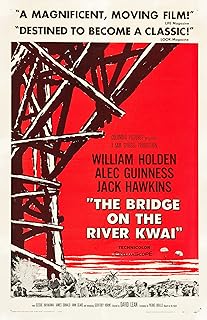桂河大桥/桂河桥
導演: 大衛連編劇: Pierre Boulle
演員: 威廉荷頓 亞歷堅尼斯 Jack Hawkins Sessue Hayakawa 詹姆斯唐諾

2009-02-17 21:56:40
軍人和自我。
************這篇影評可能有雷************
在這部影片裡大家都很自我,然而可惜的是:有自我的軍人不是合格的軍人。
尼科爾森上校是一個很自傲的人,他講原則,講法律,固執清高,認準了一條路誰也拉不回來,不惜一切代價也達到自己目的。然而在他的生命里卻沒有一樣能讓他引以為豪的東西。同是英軍的其他人沒有聽說過他,沒有人在乎他和他投降的部屬。他在印度呆了多年,造橋修路,他愛印度。他需要創造,他需要實實在在的成就。他在心裡壓根就沒有接受這是一場戰爭的現實。他是一個紳士,一個標準的紳士,他不會因為任何事而改變。
希爾茲不是個紳士,或者我可以說,他是一個混混。他根本不想打仗,不想做軍人。可是他卻很聰明,他知道如何能混過關,如何能減輕自己的痛苦。他沒有原則,沒有立場,他就是他自己很隨心,但正是這樣的人才能得到真快樂。
齊藤上校,他不是一個普通人,他是一個軍人。雖然他是鬼子,可是他是一個實實在在的軍人。他有榮辱,有羞恥心。他的目的是修建好大橋,但是最終橋卻不是他修的,他仰慕英國人的技術,同時也對自己的無能感到羞恥。在英國人修橋的時候,他為了橋能完工,放棄了自我,任由他的戰俘坐在他面前指手畫腳。他覺得這是羞辱,無人的時候他痛哭。所以無論橋能不能按時修好,他都已經決定要自殺。一個軍人的榮譽感不允許他坐享其成。無論他是不是壞人,是不是鬼子,是不是變態,我認為,他是一個好軍人!服從命令,拋棄自我,堅守自己作為一個軍人的榮譽感。
橋炸與不炸都不重要。這是戰爭,在戰爭中沒有不瘋狂的事情。如果你是一個軍人,那麼自己的是非觀價值觀都已經不再重要。
我能理解這部電影裡所有的人,可是我不讚同他們。
——————————————————————————————————
010-01-18 16:44:22 anmi
你說戰爭是瘋狂的,你說」如果你是一個軍人,那麼自己的是非觀價值觀都已經不再重要「,證明你認為戰爭的雙方都是各為其主,無所謂正義和非正義。但是恰恰那個上校的舉動說明了因為沒有是非正義觀造成的後果,那就是:一個完美的技術主義的沒有頭腦的人必然導致被奴役的後果。
2010-01-18 17:28:01 anmi
我不明白日內瓦公約在這裡有那麼重要嗎?上校在第一次的堅持軍官不勞動的鬥爭中堅持日內瓦公約我佩服他。第二次要為了證明軍人的榮耀和紀律而幫助日軍修橋又和日內瓦公約有什麼關係?日內瓦公約是為了保證戰俘的權利,但是修橋完全和這個沒有關係啊。除了日內瓦公約也是上校認為的文明和紀律中的一部份這一點而已
————
《日內瓦公約》
Convention Between the United States of America and Other Powers, Relating to Prisoners of War; July 27, 1929
引用相關部份:
CHAPTER 2. Organization of the Labor.
ARTICLE 28.
The detaining Power shall assume entire responsibility for the maintenance, care, treatment and payment of wages of prisoners of war working for the account of private persons.
ARTICLE 29.
No prisoner of war may be employed at labors for which he is physically unfit.
ARTICLE 30.
The length of the day's work of prisoners of war, including therein the trip going and returning, shall not be excessive and must not, in any case, exceed that allowed for the civil workers in the region employed at the same work. Every prisoner shall be allowed a rest of twenty-four consecutive hours every week, preferably on Sunday.
CHAPTER 3. Prohibited labor.
ARTICLE 31.
Labor furnished by prisoners of war shall have no direct relation with war operations. It is especially prohibited to use prisoners for manufacturing and transporting arms or munitions of any kind or for transporting material intended for combatant units.
In case of violation of the provisions of the preceding paragraph, prisoners, after executing or beginning to execute the order, shall be free to have their protests presented through the mediation of the agents whose functions are set forth in Articles 43 and 44, or, in the absence of an agent, through the mediation of representatives of the protecting Power.
ARTICLE 32.
It is forbidden to use prisoners of war at unhealthful or dangerous work.
Any aggravation of the conditions of labor by disciplinary measures is forbidden.
CHAPTER 4. Labor Detachments
ARTICLE 33.
The system of labor detachments must be similar to that of prisoners-of-war camps, particularly; with regard to sanitary conditions, food, attention in case of accident or sickness, correspondence and the receipt of packages.
Every labor detachment shall be dependent on a prisoners' camp. The commander of this camp shall be responsible for the observation, in the labor detachment, of the provisions of the present Convention.
CHAPTER 5. WAGES.
ARTICLE 34.
Prisoners of war shall not receive wages for work connected with the administration, management and maintenance of the camps.
Prisoners utilized for other work shall be entitled to wages to be fixed by agreements between the belligerents.
These agreements shall also specify the part which the camp administration may retain, the amount which shall belong to the prisoner of war and the manner in that amount shall be put at his disposal during the period of his captivity.
While awaiting the conclusion of the said agreements, payment for labor of prisoners shall be settled according to the rules given below:
a) Work done for the State shall be paid for in accordance with the rates in force for soldiers. of the national army doing the same work, or, if none exists, ac cording to a rate in harmony with the work performed.
b) When the work is done for the account of other public administrations or for private persons, conditions shall be regulated by agreement with the military authority.
The pay remaining to the credit of the prisoner shall be delivered to him at the end of his captivity. In case of death,- it shall be forwarded through the diplomatic channel to the heirs of the deceased.

